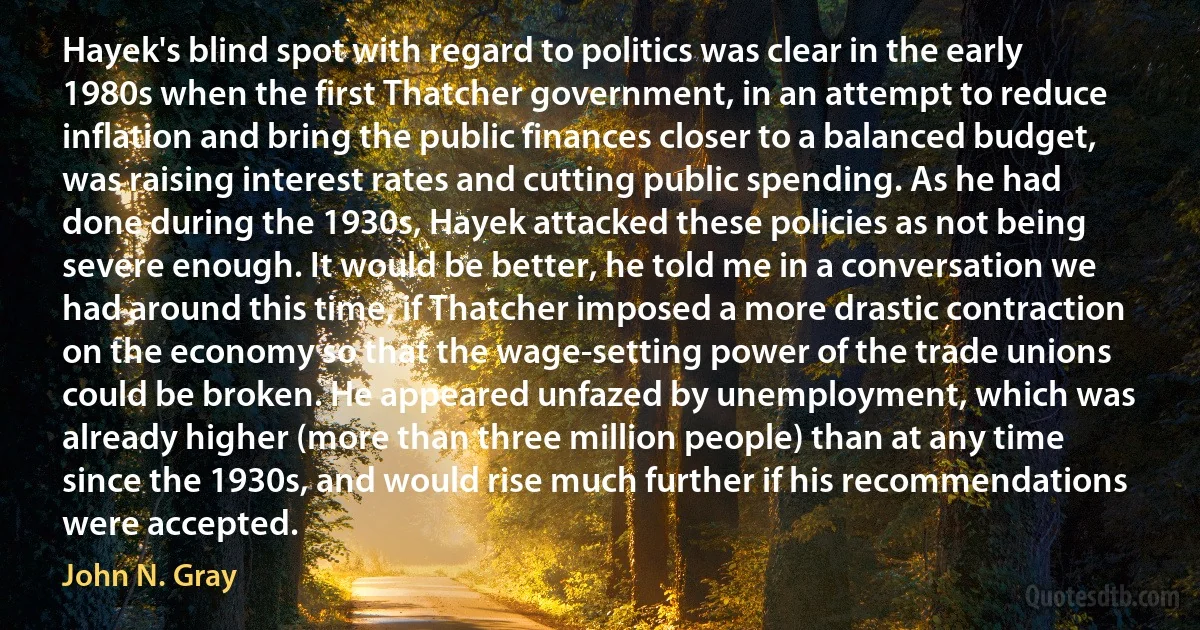
Hayek's blind spot with regard to politics was clear in the early 1980s when the first Thatcher government, in an attempt to reduce inflation and bring the public finances closer to a balanced budget, was raising interest rates and cutting public spending. As he had done during the 1930s, Hayek attacked these policies as not being severe enough. It would be better, he told me in a conversation we had around this time, if Thatcher imposed a more drastic contraction on the economy so that the wage-setting power of the trade unions could be broken. He appeared unfazed by unemployment, which was already higher (more than three million people) than at any time since the 1930s, and would rise much further if his recommendations were accepted.
John N. GrayRelated topics
attempt blind clear closer contraction conversation cutting done drastic early enough government inflation interest people politics power public rise spending spot tell thatcher three time trade 1930s 1980s higher hayekRelated quotes
With regard to domestic policy, the current burning issue is the racial question. Also in this field we will adopt the necessary solutions. Those who believe that we have obediently imitated anyone, or worse, acted on suggestions, are poor fools toward whom we do not know if we should direct our contempt or our pity. The racial problem did not suddenly burst out of nowhere, as those who are accustomed to brusque awakenings think - since they are used to long armchair naps. It is in relation to imperial conquest; because history teaches us that empires are conquered by arms but are held by prestige. And for prestige it is necessary to have a clear, severe racial consciousness, that establishes not only the differences, but also very clear superiorities.

Benito Mussolini
One outcome of the Norman Conquest was the making of the English language. ...the speech of Alfred and Bede, was exiled from hall and bower, from court and cloister, and was despised as a peasant's jargon... It ceased almost, though not quite, to be a written language. ... Now when a language is seldom written and is not an object of interest to scholars, it quickly adapts itself in the mouths of plain people to the needs and uses of life. ...it can be altered much more easily when there are no grammarians to protest. During the three centuries when our native language was a peasant's dialect, it lost its clumsy inflexions and elaborate genders, and acquired the grace, suppleness, and adaptability which are among its chief merits.

G. M. Trevelyan
If in later life she has mastered her hunger drive by ego control, she may assume that she can control her fate herself. But that ego may in fact be very weak, because it has been built by cutting herself off from the mainstream of life through severe dieting. It is built on negative rather than positive need. In a real life crisis, such an ego may fail to operate because she does not know consciously what her own needs are. [...] An ego which sets itself up against Fate is attempting to usurp the power of the Self; it swings from light to dark, from inflation to depression. Only when her ego is firmly rooted in her own feminine feeling can a woman be released from her compulsive behavior.

Marion Woodman
The United States, in order to put a stop to bloodshed in Cuba, and in the interest of a neighboring people, proposed their good offices to bring the existing contest to a termination. The offer, not being accepted by Spain on a basis which we believed could be received by Cuba, was withdrawn. It is hoped that the good offices of the United States may yet prove advantageous for the settlement of this unhappy strife. Meanwhile a number of illegal expeditions against Cuba have been broken up. It has been the endeavor of the Administration to execute the neutrality laws in good faith, no matter how unpleasant the task, made so by the sufferings we have endured from lack of like good faith toward us by other nations.

Ulysses S. Grant
Let true Christians then, with becoming earnestness, strive in all things to recommend their profession, and to put to silence the vain scoffs of ignorant objectors. Let them boldly assert the cause of Christ in an age when so many, who bear the name of Christians, are ashamed of Him: and let them consider as devolved on Them the important duty of suspending for a while the fall of their country, and, perhaps, of performing a still more extensive service to society at large; not by busy interference in politics, in which it cannot but be confessed there is much uncertainty; but rather by that sure and radical benefit of restoring the influence of Religion, and of raising the standard of morality.

William Wilberforce
